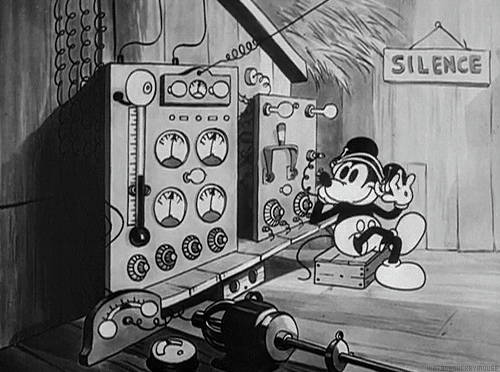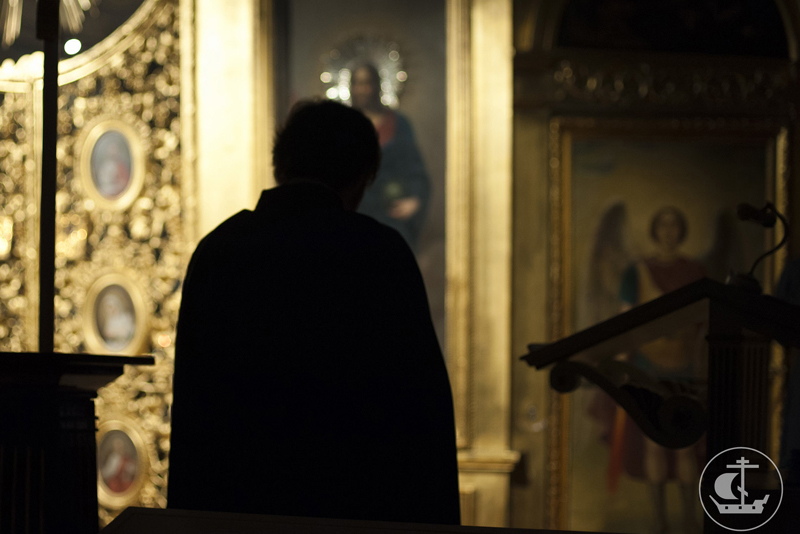
I cannot hear, Lord! How praying with the earphones is different from praying without
Many years ago, when I was a student of at the religious academy, I waded into the cell of a newly tonsured hieromonk and saw a most extraordinary scene: kneeling before the icons was the monk. He stood motionless, earphones plugged into his ears. When I entered the door, he was undisturbed. He turned around only slightly with great disappointment on his face. Young and naive, I thought to myself: ‘He must be working very hard on his Old Greek conjugations, or learning a foreign language. But why is he kneeling? What made him fall on his knees? Was it the Hymn of the Righteous Simeon? Only later did I realise what misdeed I had just committed: I had walked in on the monk as he was saying his prayer rule in pious seclusion, aided by a player device.
At a later church meeting, I asked the audience to share their views on the increasingly common practice of listening to recorded players over earphones and loudspeakers. My question was met with honest surprise: “What is wrong with it”? Have not we been doing the same at the seminary for years, when one student reads a prayer, and the others listen? How else might we accommodate the disabled and the infirm who would otherwise not be in a position to pray at all?
But leaving aside the infirm and the sick, let us now focus on the sound and the able-bodied. Today, listening to recorded prayer rules for monastics or the Communion, and recorded psalter readings have become commonplace. As a faithful is driving to a worship service, what better thing might he do than listen to prayer on his car radio. One would think that this would be more beneficial than just driving safely and looking out for dangers on the road. Just driving, it seems, would be too impious, uninteresting and outright useless. Surely, sounding the prayer on the car stereo is essential. Just imagine what it could be like – divine sweetness pours generously from the stereo, goodness fills every bit of the space within the car as it is rushing on the surface of this earth full of sin and fretfulness, cutting through the darkness of doom and ignorance at 140 kilometres per hour.
On one of my visits to Greece, I visited a pious Greek Orthodox family had once given me, a poor student, a very generous and hearty welcome. We talked and discussed many subjects – mainly religious – and I was impressed how well versed this simple Greek woman was in questions of church life, the teachings of the church fathers and the details of their biographies. Not only did she know the Greek saints well, but she was also deeply familiar with the Russian saints. It was nearing 10 p.m. My host excused herself, left the table, walked up to her stereo and turned on the radio. After a few moments, I heard the sounds of the evening prayer rule in Greek. It was the Greek church radio. A 24-hour service. The reading was excellent – pious, endearing and repentant. Very church-like. My host crossed herself devoutly, turned herself towards the icons, bowed to them, and what do you think happened next? She went back to the table to finish off the freshly baked lamb and continue the conversation. We ate and drank, we talked and laughed to the sounds of the small Compline and the Akathist coming from the loudspeaker. When the prayers were over and they began to play church music, the woman turned off the radio. The prayer rule was finished. The day’s tribute to God had been paid. One could sleep with a clear conscience.
When a priest asks a faithful about to take communion is they had read the full prayer rule, one is somehow tempted to add: ‘have you prayed?’. Reading out the prayer rule without the prayer inevitably leads us to ‘listening through it’, then listening to some of its parts, and listening while doing other things.
On the one hand, one may indeed be better off listening to somebody else’s prayer than not reading one’s own. One would also have something convincing to reply to possible questions from the priest in a confession, like “yes, father, I have listened to the prayer rule.” Or more honestly, have heard parts of it.
All of this begs the nagging question – who would need this kind of prayer? What purpose might it serve? It seems to me that all it is good for is to please the god of our conceit.
To show that we are not like ‘those other people’ who do not pray, or repent, but who listen to all sorts of impious things and do all manner of wrongs. The ignorant of the world who do not know how to bring properly their sorrows, joys and griefs before God and are too afraid to make a move. Now we know better. Plug a flashcard with the audio in the system, and let God hear all of our petitions in the sweet and pious voice of a professional speaker at the right volume. All the text has been tried and tested many times over. Safe and efficient. Satisfaction guaranteed. And we have enough time to take care of our daily business.
I remember the words of one priest that touched a raw nerve in me. He said that the saints were urging themselves to pray throughout their lives. How bad they did not have our technology and civilisation. How little did they know about the high-tech devices and their capability to turn the painful act of urging themselves to pray into an easy and entertaining pastime! They had to subject themselves to an enduring exercise in prayer consisting of many stages and lasting many years. We have a much easier lot. We can get ourselves to pray at the push of a button. And once the device is on, we may rest and listen.

Soren Kierkegaard remarked:
“The whole world and existence are sick. If I were a doctor, and I was asked for advice, I would respond, ‘Make silence!’ Without the silence, God’s word might not be heard. The word of God loses divinity when we have to turn up our loudspeaker to outshout the ambient noise. Hence the call to make silence.
Is not prayer supposed to be a conversation with God, which may not happen otherwise than in silence? Can it be true that we have heard from God everything we needed to hear, and have nothing more to say to Him? Have we lost our ability to make our own prayer, preferring to hide behind other people’s words? Have we just become too lazy?
I do not know about you, but it sometimes gives me jitters to watch the basic elements of our religious lives – such as prayer, fasting or repentance – turn into religious regalia to be acquired with little or no effort. – There is only one difficulty with this: the regalia will take you to the Kingdom of Heaven. We came into this world unclothed and will depart from it in the same manner. – How painful and horrifying would it be for those who have become adept at keeping God at bay by performing ritual gestures to hear from God: ‘I never knew you. Away from me, you evildoers!’ Perhaps at this moment, we will realise at last that God has His voice with which He speaks, if quietly, to every person; and when he does, he does not do so with quotes from the Scriptures and the prayer books.
It would not occur to anyone to come to a date with a recorded expression of love, and then play the recording to one’s better half when she feels sad. But we think it is normal to do the same with God.
Someone asked Father Cyril Pavlov early in the 1990s: Father, can one be saved by listening to prayers on a tape recorder. The father smiled and said: “I do not know about the man, it sure will not harm the tape recorder.”
Translated by The Catalogue of Good Deeds
Source: https://foma.ru/nichego-ne-slyishno-gospodi.html





“It would not occur to anyone to come to a date with a recorded expression of love, and then play the recording to one’s better half when she feels sad. But we think it is normal to do the same with God.”
Well said, Archpriest Peter.